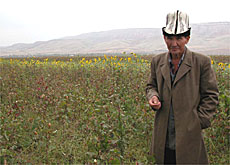Success still eludes “Helvetistan” after 11 years

Switzerland has represented several Central Asian countries and Poland for over a decade at the World Bank and the International Monetary Fund (IMF).
The arrangement gave Switzerland more clout in those institutions while the countries concerned received Swiss help in adapting to a market economy.
It was no accident that the Swiss became involved Uzbekistan, Kyrgyzstan, Tajikistan, Turkmenistan, Azerbaijan and Poland.
With the collapse of the Soviet Union in 1991, Switzerland saw an opportunity to get on to the boards of the Bretton Woods institutions – the World Bank, the IMF and the European Bank for Reconstruction and Development.
The group became known as “Helvetistan”, and since 1992, the Swiss authorities have backed a series of projects aimed at easing the transition towards a market economy in those countries.
“As a small country, Switzerland was wondering at the time whether it should join a group of countries that were already members of these institutions, or create its own,” said Bernard Gasser of the State Secretariat for Economic Affairs (Seco).
Geopolitical forces
Geopolitical forces were changing in the early 1990s. A new Europe was taking shape with the fall of the Iron Curtain, and a number of former Soviet republics were busy declaring their independence.
The Central Asian republics had been against the dissolution of the Soviet Union, mainly for financial reasons. Its collapse meant the end of subsidies from Moscow, which had financed their development for the best part of 80 years.
Otto Stich, the Swiss finance minister at the time, decided to convince these republics that Switzerland could defend their interests at the World Bank and the IMF, if they were prepared to form a group.
In exchange, Switzerland was prepared to support these countries as they moved towards a market economy.
Credible partner
“Others were trying to get the republics on their side, but Switzerland had their trust and was considered a credible partner,” said Denis Knobel of the Swiss Agency for Development and Cooperation (SDC).
But to be able to speak for countries such as Uzbekistan, the Swiss also had to get to know them much better.
This led to the opening of cooperation offices in Bishkek (Kyrgyzstan), Dushanbe (Tajikistan), and Tashkent (Uzbekistan).
Through Seco and the SDC, Switzerland has backed a number of projects, such as promoting democracy, water management, modernising farming techniques or setting up companies.
Tens years on, Bernard Gasser says the results are far from what was hoped for. “The transition process is taking much longer than we thought, and we haven’t had any real successes in Central Asia,” he told swissinfo.
Stability
Kyrgyzstan has managed to reach some kind of macroeconomic stability, but still needs to make real progress on the political front. Tajikistan suffered from civil war for five years and has only begun to return to a “normal” situation.
Turkmenistan and Uzbekistan are labouring under authoritarian regimes. Knobel says both have specific identities and need to develop their own systems to get out of the economic transition phase. Existing structures often tend to slow down the process.
“We cannot tell them what to do,” added Knobel.
Azerbaijan is also still struggling to adapt to a market economy. It has substantial reserves of oil, but corruption and disputes with its neighbours are hindering development.
Poland has been more successful – it has largely completed the transition to a market economy, and will join the European Union in 2004.
Switzerland has however benefited from its presence in Central Asia, where it did not play a role before 1992. “Thanks to our presence and our long-term support, we have been able to develop a true relationship based on mutual trust with these countries,” said Knobel.
“Switzerland’s projects in the region are clearly identifiable from those of other countries.”
swissinfo, Jean-Didier Revoin (translation: Scott Capper)
Helvetistan is the name given to the group of countries represented by Switzerland at the IMF and the World Bank.
Since 1992, Switzerland has been helping Uzbekistan, Kyrgyzstan, Tajikistan, Turkmenistan, Azerbaijan and Poland to make the transition to a market economy.
With the exception of Poland, the Helvetistan group is struggling to adapt.
A group of swissinfo journalists went to visit Swiss projects in two of those countries, Uzbekistan and Kyrgyzstan, to see the results for themselves. Stories about their trips will be published on swissinfo over the coming weeks.

In compliance with the JTI standards
More: SWI swissinfo.ch certified by the Journalism Trust Initiative









You can find an overview of ongoing debates with our journalists here . Please join us!
If you want to start a conversation about a topic raised in this article or want to report factual errors, email us at english@swissinfo.ch.